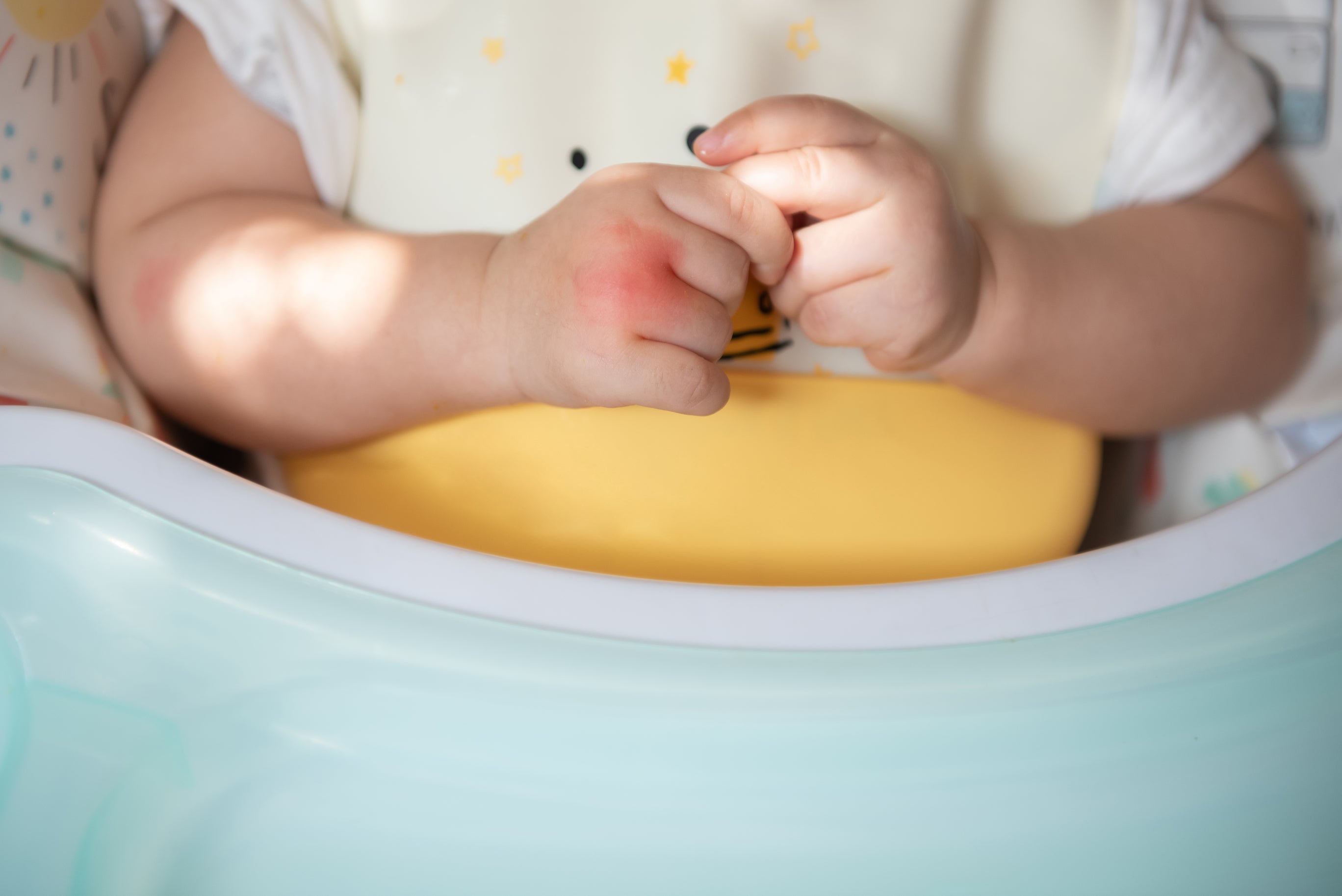
Is Aloe Vera Good for Babies?
Share
"Can I put aloe vera on my baby?" is a question you must have thought about, especially if you're a fan of incorporating natural ingredients and home remedies in your skin and hair care routine.
After all, aloe vera is a popular natural remedy for a variety of skin conditions. It is known to have soothing and healing properties and can be used to treat burns, cuts, and other skin irritations.
But again, the question is: what about aloe vera for babies? Is aloe vera safe to use on their delicate skin? Is aloe vera good for them?
The answer is yes, aloe vera is generally suitable for the tender skin of babies.
However, it is important to talk to your baby's paediatrician or dermatologist first. Additionally, always patch-test any ingredient, natural or otherwise, on your little one's skin before using it generously and regularly.
Also, be sure to purchase organic and pure aloe vera gel that does not contain any additional ingredients (such as fragrance).
In this article, we will explore some of the benefits of aloe vera for baby skin.
The Benefits of Aloe Vera for Babies
Around the world, many consider aloe vera, a fleshy succulent plant, to be downright wondrous. In fact, aloe vera has been used for centuries for maintaining healthy skin and shiny hair.
It's thus no wonder that parents wish to make use of the aloe plant and its medicinal benefits for their little ones.
However, it's important to know that it's best to use aloe vera on babies older than 3 months, just to be on the safe side.
Moreover, please note that it's not a good idea to give aloe vera orally to babies. Whilst applying aloe vera on a baby's skin is generally safe, oral consumption of the plant's gel or juice by infants is not recommended.
Now, let's explore the benefits of applying aloe vera topically on your baby's skin.
Aloe vera is a fantastic natural moisturizer
Aloe vera can help to soothe and hydrate your baby's sensitive skin; the natural gel contains humectants that bind moisture to the skin. It also stimulates the production of collagen and elastin fibres, making the skin stronger and more elastic.

If your little one isn't allergic to aloe vera, using a small amount of the plant's gel as a moisturizer is a good idea as it will aid the natural barrier of your baby's skin. It also has a cooling and soothing effect, so your infant will definitely enjoy the feeling of aloe vera on their body!
Aloe vera soothes diaper rash
If your baby suffers from diaper rash or other minor skin irritations, aloe vera is a great remedy.
Due to its anti-microbial and anti-inflammatory properties, aloe vera gel can help reduce redness and irritation, promote healing of the skin, and protect the skin from microbes.

Aloe vera contains vitamin E (along with vitamins A, B1, B2, B6, B12, and C) which has been linked with wound healing.
Apply the aloe gel to your baby's clean bottom and let it dry before putting on a nappy.
However, it's best to let your baby's bum enjoy some soothing aloe vera and fresh air, as these two elements will allow the nappy rash to heal more quickly.
Aloe vera can help in combating baby eczema
Eczema (or dermatitis) is a common skin condition in babies, and aloe vera may be able to soothe the symptoms by reducing inflammation and promoting healing. Additionally, its cooling sensation will provide relief to your baby's itchy and painful skin.

Aloe vera gel also promotes the growth of collagen, has antifungal and antibacterial properties, and is an antioxidant.
Thus, even though there isn't enough scientific research positively linking aloe vera and eczema relief, the active ingredients in the plant are likely to help with the symptoms of eczema and protect damaged skin.
Clean your baby's skin with mild soap and water, and then apply pure and fresh aloe vera gel to the eczema patches. Repeat this procedure at least twice a day.
Make sure your baby doesn't eat the gel!
Aloe vera helps with cradle cap
Cradle cap (infant seborrheic dermatitis) is a common form of skin irritation that usually affects babies. If your baby has crusty and oily yellowish scales on the scalp, chances are that it is a cradle cap.

The good news is that cradle caps aren't infectious, itchy, or painful. They do not bother your baby, but they sure don't look great!
This is where aloe vera gel comes in. You can apply some aloe gel to your baby's scalp and hair and use your fingers or a soft brush to gently loosen and remove the flakes and scaly patches of skin. The salicylic acid in aloe vera softens the outer layer of skin and helps it shed.
Usually, cradle caps go away on their own in a few weeks or months and do not require medical assistance.
Aloe vera gel, combined with a mild shampoo, might just speed up this process! Additionally, it's possible that aloe gel will help with your baby's hair growth.
However, do consult a doctor if you see wounds or patches of raw and/or infected skin on your baby's head.
Aloe vera is great for insect bites
Due to its anti-inflammatory, anti-bacterial, soothing, and infection-fighting properties, aloe vera gel is considered to be a great way to combat insect bites.

If your baby gets bitten by a pesky mosquito or ant, simply apply some aloe gel to the affected area to relieve itching. You can even put the aloe gel in the fridge for a few minutes to amp up its cooling factor before application.
Additionally, aloe vera can also help with mosquito or insect bites that have been scratched because it is a natural healer.
As long as your baby isn't showing dangerous symptoms of an allergic reaction to insect bites (such as difficulty breathing, facial swelling, and intense hives — in which case you need to rush your child to the hospital), you can treat the insect bite at home and without the help of a medical professional.
Aloe vera can soothe mild sunburn
If your baby gets a mild sunburn, a small amount of aloe vera can help soothe the burning sensation and promote healing of the irritated skin.

Plus, as mentioned before, aloe vera also has hydrating properties, so it will also be able to moisturize and protect your infant's skin.
Aloe vera is safe for your baby's face as well — just make sure you avoid the eyes, nostrils, and mouth during application.
Dress your little one in loose cotton clothes and make sure you use pure aloe vera gel that doesn't contain any harmful chemicals or artificial fragrances.
Additionally, if your baby has a severe sunburn, blisters, or is in pain, please see a doctor immediately. Infants under the age of one should also seek medical assistance in case of sunburn (no matter what the severity).
Say Hello to Aloe Everyday
Clearly, aloe has a number of benefits and makes a great addition to your baby's skin and hair care routine. Plus, the plant looks quite pretty when kept indoors.

The succulent plant is very easy to grow and keep — you can have your own potted plant thriving indoors. Although it can be a bit time consuming to extract the gel from an aloe vera leaf every single time, you will have a supply of pure and fresh aloe gel at your disposal.
Overall, aloe vera is extremely soothing and can be a great natural remedy for many common baby skin problems, such as dryness, diaper rash, eczema, cradle cap, and sunburn.
However, as with anything else, it is always best to speak to your baby's paediatrician or dermatologist before using aloe vera on their skin.
Additionally, do a patch test first to ensure that your child's skin does not have any allergies to this popular plant.
The Goodness of Aloe Vera with Nature's Baby Organics
We've talked a lot about how aloe vera is good for your baby's skin.
However, not everyone has the time to grow an aloe vera plant and extract the gel every single time it is required. Additionally, many parents would like organic baby care products containing aloe vera that can be used for a variety of purposes.
Now, what if we told you that there are excellent plant-derived, minimally processed, vegan, and USDA Certified Organic products that contain aloe vera and other natural ingredients that are extremely beneficial for your child? Sounds good, right?
Say hello to Nature's Baby Organics!
Nature's Baby Organics, a reputed and well-loved company dedicated to providing parents with the most natural baby products, has a range of fantastic organic products containing the gentle goodness of aloe vera.
From the Face & Body Lotion and Moisturizer (Fragrance Free) (containing organic aloe, jojoba oil, chamomile, and calendula) to the Shampoo & Body Wash Lavender Chamomile (containing organic aloe vera juice, lavender oil, calendula, and chamomile), our products are packed with natural ingredients that are suitable for all skin types, particularly the sensitive skin of babies.
Check out our website today for effective and soothing baby products that are devoid of harsh chemicals such as parabens and SLS.
